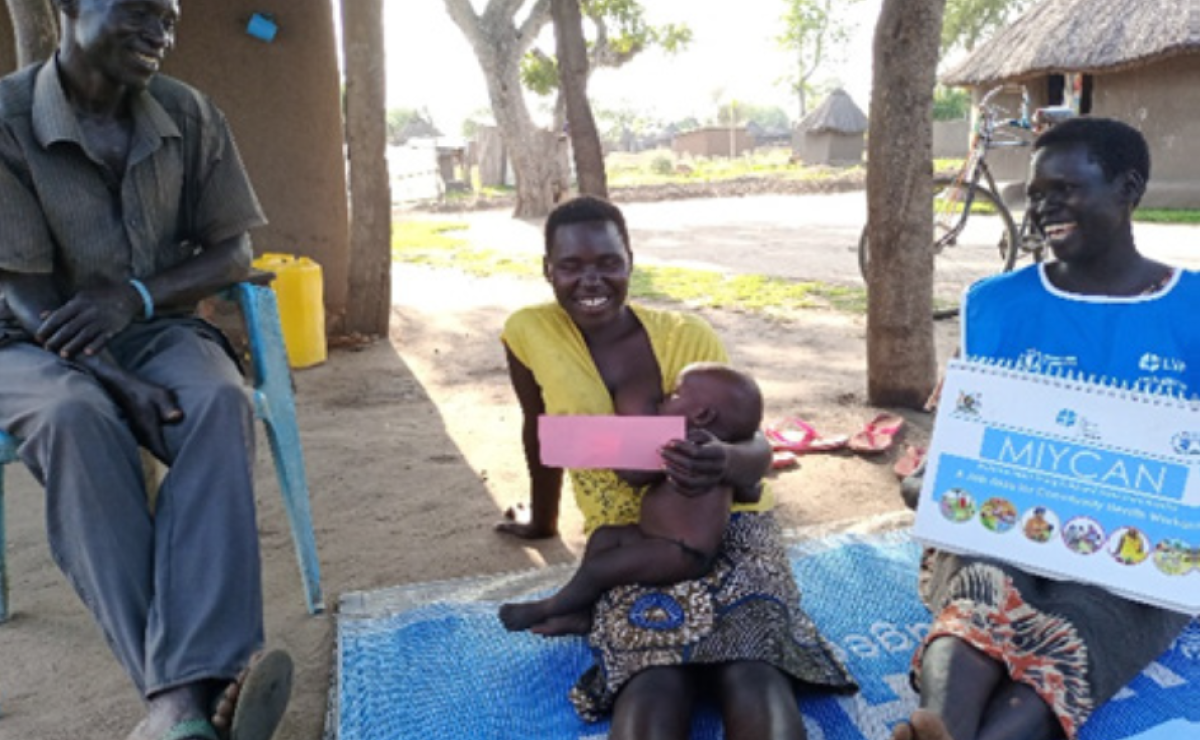Promoting healthy diets among households through backyard gardening

LWF facilitates and trains peers to train others on substance abuse, post-abortion care, family planning referral, psychosocial support and teenage pregnancy through face-to-face and group sessions. The peer educator also encourages the girls to roll back to school.
Malnutrition is a common problem that refugees face. For instance, the annual Food Security and Nutrition Assessment 2020 conducted by the government of Uganda and partners shows that Palorinya Settlement had a Global Acute Malnutrition rate of 5.3 per cent. The anaemia prevalence of 57. 8per cent among children under five and women of reproductive age. The settlement is home to many South Sudanese refugees fleeing decades of conflict. A malnourished child is prone to getting and suffering from other diseases, including malaria and diarrhoea. This, in the end, leads to infant mortality and morbidity. It is a problem that LWF, with funding from the United Nations World Food Program (WFP), initiated mother care groups in nutrition sensitisation activities to address. The group approach promotes the utilisation of small spaces to establish backyard kitchen gardens for fast-growing vegetable species and equip refugees with knowledge of livelihood ventures. In 2020, through community leadership and structures, LWF identified 27 care groups across all zones in the settlement.
Esther Wuka belongs to the Tinate care group. She is a leading mother. She is among the 15 lead mothers who make one of the care groups in the entire settlement. At Belle Health Centre 3, she started lessons about kitchen gardening and sustainable livelihoods from LWF. She has used the knowledge from the modular training to set up a model home within her community where the family rears small nutritious domestic animals such as rabbits, guinea pigs, goats, ducks, chickens, and pigeons. These animals are kept for dietary supplements but also sale. A pair of guinea pigs, for instance, goes for Shs 40,000. “I now teach other mothers [about] the benefits of kitchen gardening and livelihood diversificationthrough rearing these domestic animals,” she says. “I feed my pigs some grass and sweet potato leaves. I use their droppings in the gardens as manure. She encourages other households to tap into the opportunity of establishing backyard gardens or rearing these domestic animals because they are cheap to look after and do not require much to start up,” she adds. She hopes to acquire animals like goats from the income generated from selling the small animals. Buba, a mother of twins in the same settlement, knows what malnutrition is. One of her twins, she says, stopped breastfeeding and thus became malnourished. She took the baby to the local Health Center with the assistance of a care group mother.
At the healthy facility, she was advised to breastfeed her babies at least eight times a day and prepare food for them. It was good advice, but Buba could not afford food for her babies. She soon enrolled in training offered by LWF, where she learnt how to plant nutrient-rich vegetables throughout the year at a space in the nutrition centres and their homes. Buba's children now feed on a balanced diet and are gaining weight. Modong, a member of Bright Star Care Group, says the LWF programme has helped to lower malnutrition, especially among children, lactating and pregnant women,
This initiative has proven to be very effective as mothers participate actively in finding solutions to fight malnutrition and earn income to support family needs. Mr Kenyi, one of the refugee leaders in the Palorinya refugee settlement. “I am glad many mothers have practised this in their homes. Nowadays, many of us worry less about food because we have a variety of vegetables in our gardens. The local traders also buy from us instead of travelling for two hours to the market,” Kiden, another beneficiary, says. Care groups are community behaviour-change approach groups whose members work on voluntary bases, and most of the groups are village loan and saving groups. This ensures the group's sustainability, and ventures like kitchen gardening proceeds are 100% for the group.
-END-

